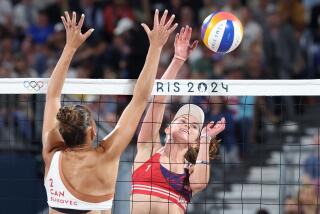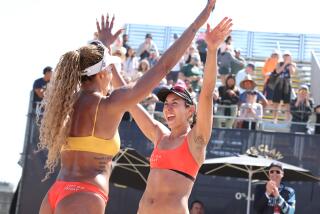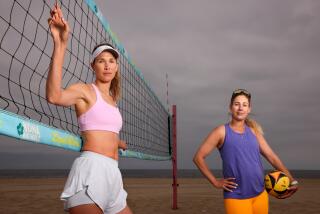Stevenson Playing New Game, but Misses Old One
- Share via
You could see it in Ronald Reagan’s face, and in Jimmy Carter’s hair.
And you can see it in Jon Stevenson’s body. Stevenson has lost 11 pounds since becoming president of the Assn. of Volleyball Professionals in October.
Such are the marks of an office holder.
Manhattan Beach’s Stevenson, one of beach volleyball’s elite players the past decade, has found that his executive duties have--at least partially--slowed his abilities on the court.
“There’s a real correlation between mental toughness and physical strength,” Stevenson said. “You can be as tough as you want in the boardroom, but it’s a different story when you’re on the court playing against big, strong guys who are mentally prepared.”
Preparedness has been one of Stevenson’s strongest suits. At 6-foot and 180 pounds, Stevenson has excelled as a little guy in a big man’s sport--mainly by supporting his physical and mental condition with rigorous off-season training.
This season has been different, however. Elected as AVP president in October, Stevenson had to oversee a player revolution that ended up completely restructuring the organization over the winter and spring.
Then there was an extended bout with a viral infection and strep throat that sapped Stevenson’s strength for much of the year and caused him to miss the Manhattan Beach Open in June.
“I’ve been playing by the seat of my pants,” Stevenson, 33, said. “My appetite was gone, my energy was gone. I just felt like dying.”
What it adds up to is that the man who had 23 career open victories going into this season has none this year. A consistent top-four finisher, Stevenson has come in 13th place three times this season.
Stevenson has twice finished third and has earned more than $30,000 this season, but that is nothing like $100,000-plus he earned in 1988.
“I was beginning to wonder if I was too old, or if my lack of off-season training had set me back that much,” Stevenson said. “I really didn’t feel like playing at times. I kind of felt wrong all year, and that’s not right for a professional athlete.”
Stevenson’s game is coming around. He took a third place at Seal Beach three weeks ago with tour rookie Mike Whitmarsh.
He’ll be going into this weekend’s USA Championships of Pro Beach Volleyball at Hermosa Beach--which carries the richest purse in the sport’s history at $200,000--teamed with veteran Ricci Luyties.
Stevenson isn’t about to concede defeat at Hermosa--”Who knows, maybe Ricci and I will win it,” he said--but he admits the restraints of his AVP office are tugging him away from where he wants to be, on the beach.
On Wednesday, instead of practicing with Luyties for the Hermosa tournament, Stevenson had to go to the offices of the AVP’s legal counsel to review proposals for the association’s pending contract with the Miller Brewing Co., the tour’s major sponsor.
“It’s very difficult at this stage to do a good job as a player representative and still be an elite player at the same time,” he said.
Stevenson himself was surprised to become the leader of what he calls a “revolution of sorts” within the AVP last winter.
Especially since that revolution struck the very foundations of the organization.
Stevenson is one of a handful of beach pros who remember the fledgling days of the beach tour when tournament prizes were a six-pack of beer and a T-shirt.
And he was one of the sport’s earliest activists. In 1983, when players like Stevenson and Mike Dodd became dissatisfied with their first promoter--Event Concepts--they turned to an old friend from Mira Costa High, Leonard Armato.
Armato--the Century City-based attorney who has become agent for beach great Sinjin Smith, as well as former Laker Kareem Abdul-Jabbar and Phoenix Suns guard Kevin Johnson--helped guide the players through the formation of the AVP that year, consolidating the players into a solid bargaining voice.
But it was Armato, the AVP’s executive director, marketing agent and legal counsel, who was toppled in last winter’s political maneuverings.
“We players were naive to the obvious conflicts of having one guy do all three jobs for us,” Stevenson said. “It was a tremendous amount of control for one man to have.”
So Stevenson and the AVP’s board of directors arranged for an audit of the association’s financial records and hired legal representatives to negotiate with Armato.
“The stakes had grown and the players needed to reassert that the players were supposed to control their own destinies,” Stevenson said.
A series of legal maneuvers ensued, and factions rose and fell within the body of players. While Armato felt he had a rightful claim to his reward for his early efforts, the players argued about the extent of that reward.
“It was really unfortunate the way it unfolded,” Stevenson said. “I had an allegiance to Leonard as a friend, but I couldn’t look past my responsibilities as player representative. I had benefitted from Leonard’s leadership all along, but the players were calling for something different.”
And Stevenson, who had been elected to replace incumbent Smith as the AVP president, had gone from a man trusted and well-liked among his peers to a leader subject to criticism--both openly and in private.
“I wanted to try to please everybody, but there was a lot of mud-slinging going on on both sides,” Stevenson said. “I heard the grumblings. It took a
huge toll from me.”
In the end, the unthinkable happened. The AVP, under Stevenson’s direction, severed its ties with Armato and had to start from scratch during the spring.
The players had to hire a new public-relations agent, legal counsel and accountant, find new office space and retrieve documents from Armato’s office before this season started.
“It was a real skeleton crew operation,” Stevenson said. The most enduring legacy of Stevenson’s leadership remains to be seen.
For the past two months, the AVP has been negotiating with the Miller Brewing Co. on a new three-year contract. The previous three-year package expires with this weekend’s landmark Hermosa Beach event.
What has complicated the negotiations was the strength of the relationship between Miller and Armato, who cultivated the beer company as the tour’s lifeline since the association’s earliest days.
“We were faced with a question of legitimacy with our major sponsor,” Stevenson said. “I mean, here we were, just a bunch of players taking over.”
Stevenson said negotiations have been going well with Miller, but he remains cautiously optimistic. The AVP is on the verge of a deal that will have huge implications for the sport of beach volleyball.
“We’re really close to finalizing a deal that spells great things for the AVP,” Stevenson said. “I’d like to get it done real soon, since the extended world of volleyball is all looking in on it.”
What Stevenson is aiming for is a package that will boost the AVP on its way to being recognized as the universal sanctioning body for the sport--”the NBA or PGA of beach volleyball,” as he puts it.
Proposals are on the table between the AVP and Miller that call for roughly $8 million in prize money over the three years--double the figure enjoyed by beach pros over the past three.
Stevenson and his progressive board of directors have already made policies aimed at the interests of rank-and-file beach players--policies that Stevenson feels are part of the watchdog role of his office.
For example, this weekend’s Hermosa event--like all tournaments over $100,000 in prize money--has a prize scale that includes a share of the $200,000 payoff going all the way down to 17th-place finishers.
Negotiations were also successful in increasing the field for Cuervo Gold Crown events--traditionally eight-team all-star tournaments--to include a field of qualifiers.
“It’s been tough learning how to do this,” Stevenson said. “I’ve learned a lot more in a year than a lot of people in college learn in an MBA program.”
It hasn’t come easy, however. Before his third-place finish at Seal Beach with Whitmarsh, Stevenson was considering quitting the tour to become the AVP’s full-time president.
It’s a decision that he is still considering.
“It’s going to be a hard decision,” Stevenson said. “The sport deserves a full-time player representative, especially with the new deal that’s brewing. The sport’s in a position to really come into its own as a professional sporting event.
“On the other hand, I’m an athlete, and I think I can still play and win tournaments.”
He pointed out that Smith, no longer AVP president, has enjoyed his greatest success on the beach this season.
Stevenson is stuck with two images of himself--one of the high-flying, overachieving athlete who was able to reap the financial rewards of the sport he loves; the other being the administrator who helped guide that sport through one of its most difficult crisis periods.
Stevenson is certain of one thing.
“It’s going to be a lot of work either way,” he said.
More to Read
Go beyond the scoreboard
Get the latest on L.A.'s teams in the daily Sports Report newsletter.
You may occasionally receive promotional content from the Los Angeles Times.










